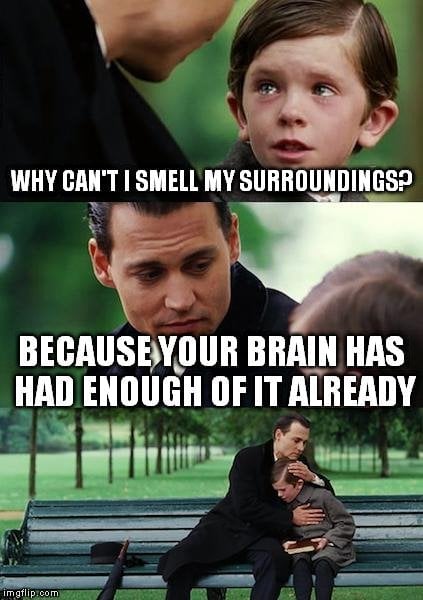Table of Contents (click to expand)
When we are exposed to a smell constantly, like that of the perfume we are wearing, our nose gets used to the smell and stops noticing the smell. This is called nose blindness. Smelling something else might help you re-smell your perfume.
It’s probably happened many times before—you buy an expensive, much-hyped perfume from some swanky outlet to wear on an all-important occasion. When the day arrives and you spray it on yourself, you feel ecstatic. However, after a few minutes, that pleasurable scent seems to vanish from your body!
There are innumerable instances when this rather strange phenomenon happens. For example, perhaps you’ve entered an acquaintance’s house (whom you don’t know that well), and a distinctive smell of urine flutters through your nostrils, and you know instantly, without their telling you, that… there’s a kid in the house.
However, as you sit down for dinner, you no longer smell anything out of the ordinary in the aroma of the house. Where did the smell of urine go? Did the newborn baby go out for a walk all by himself?
Probably not. What has happened is that you ‘got used to the smell’.
Recommended Video for you:
Nose Blindness: Our Noses Get Used To The Scent Of Our Perfume
Pamela Dalton, a cognitive psychologist at Monell Chemical Senses Center, who has spent more than 20 years of her life researching scent memory and “nose blindness”, also called olfactory adaptation, claims that the idea of your nose getting used to a particular smell is quite valid and has played an instrumental role in how humans have evolved over tens of thousands of years.
The process of smelling is pretty straightforward; when you first smell a scent, the smell receptors in your nose transmit a signal to the limbic system of your brain. There, how the smell is going to be perceived will be decided, which obviously affects how you are going to feel about the particular smell. However, as you smell the scent, your brain becomes used to it, and you gradually stop noticing that aroma.
Take a moment right now. Stop reading this and smell your surroundings… do you smell anything unusual? Probably not, because your brain has gotten used to whatever smell is around you.

Scientists don’t know why our brains become accustomed to a particular smell so quickly, but what they do know is that it happens to everyone, even animals. From 1mm worms to flies to rats and other animals that can smell all showed olfactory adaptation. If they were exposed to the smell from a young age, or repeatedly, the animal would eventually not notice the smell, and therefore would not move towards or away from the smell.
Pamela Dalton carried out a little study she did on people, which she describes to The Cut, wherein she gave a pine-scented air freshener to the participants for three weeks. After using it for a few days, many asked, “Are you sure it’s still working?”
As R.W. Moncrieff writes in his 1956 investigation on the olfactory adaptation, “[…] the perfume of a spray of honeysuckle can be powerful and enchanting at the first sniff, but as endeavour is made by repeated sniffs to prolong the enchantment, the smell becomes progressively weaker and less and less satisfying. As a measure of compensation, unpleasant odours also become less and less noticeable.”
Why Does It Help To Forget A Smell?
This same trait gave humans an edge when tackling life-threatening situations, such as withstanding a predator’s attack, finding food where it was not readily available, and so on. We’re able to quickly pinpoint strange smells and have strong reactions to that smell. For example, you can detect the strong whiff of rotting food in your home, and respond to it with disgust, which then motivates you to (sadly) throw that food in a bin.
Using Scents To Sell You Things
Brands can use scent marketing to make you subconsciously associate a pleasant smell with a brand. Certain smells can bring on certain emotions. We spoke of disgust earlier. But, smells such as lavender can calm you down.
For example the movie theater, a place which inevitably reminds you of popcorn. You might get accustomed to the smell of popcorn, but every time you’re at the movies, or you’re watching a movie at home, you’ll have the munchies.
And if you have a scent you wear everywhere, even if you can’t smell it, it’s likely your friends and coworkers associate you with that scent.
How To ‘Clear Your Nose’ Of A Smell
Since the human nose gets used to particular smells quickly (in a few breaths, according to Dalton), it becomes essential for perfume-sellers that the noses of their potential clients are cleared before they smell each different perfume.

For this, there are several methods, often referred to as ‘nose-clearing techniques’, that help to clear the nose of any ‘residual smell’ that you acquired from another object. Smelling coffee beans, a swatch of wool, or even an un-fragranced forearm, are some of the most common nose-clearing techniques.
Next, when you’re wearing an exquisite perfume and wondering why you can’t seem to smell the fragrance, a few coffee beans may help you get a fresh whiff so you know that you’re still smelling great!
References (click to expand)
- Utility Menu - www.sciencecamps.psu.edu:80
- http://web.archive.org/web/20220210045947/https://staff.washington.edu/raista/Secret%20Scents.pdf
- When we spray perfume into the air, we smell the particles ....
- The Sense of Scent - jrscience.wcp.muohio.edu
- The Reason You Can't Smell Your Own House.
- Dalton, P. (2000, August 1). Psychophysical and Behavioral Characteristics of Olfactory Adaptation. Chemical Senses. Oxford University Press (OUP).













